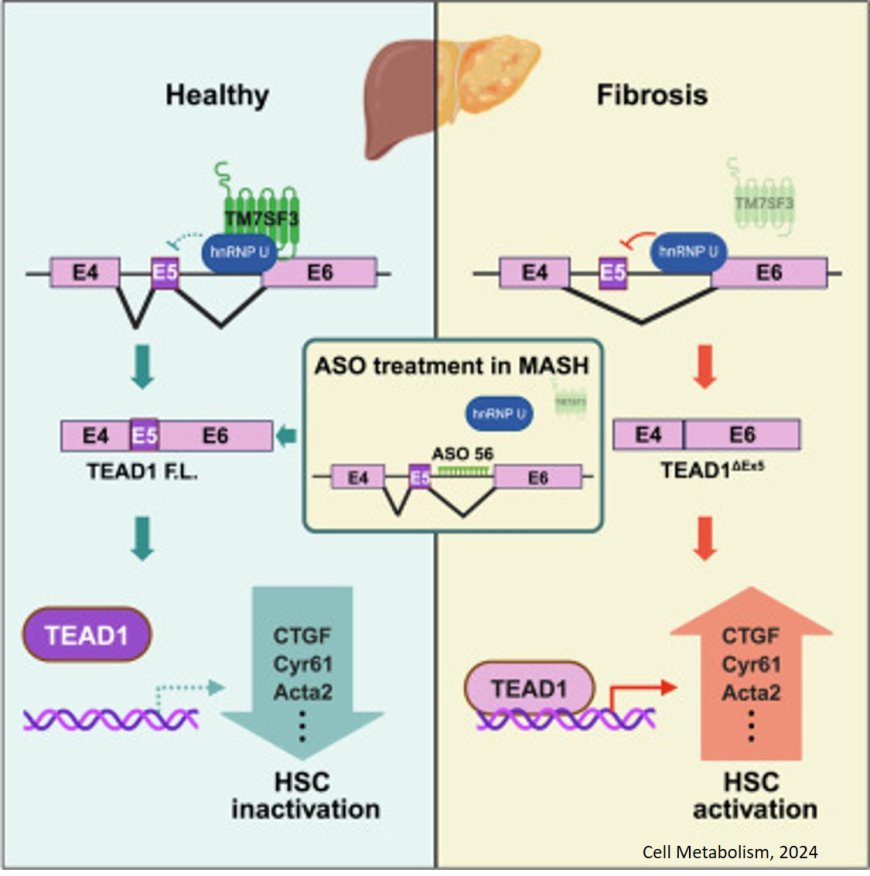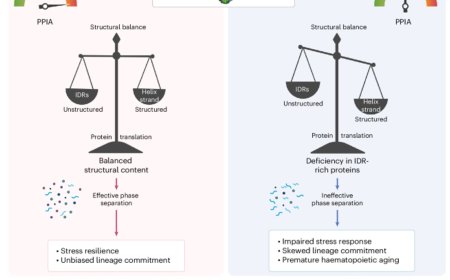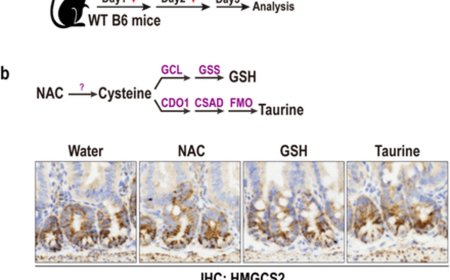Role of alternative splicing in liver fibrosis

A healthy liver filters all the blood in your body, breaks down toxins and digests fats. It produces collagen to repair damaged cells when the liver is injured. However, a liver can produce too much collagen when an excess accumulation of fat causes chronic inflammation, a condition called metabolic dysfunction-associated steatohepatitis (MASH). In an advanced state, MASH can lead to cirrhosis, liver cancer and liver-related death.
The cells that produce collagen in livers are called hepatic stellate cells (HSC). In a new paper published in Cell Metabolism, scientists investigated how these cells are activated. They found a three-component signaling pathway in the nucleus that functions according to a sort of police-controlling-the-police model.
In healthy livers, the first molecule in the pathway inhibits a second molecule, which inhibits the molecule that stimulates collagen-producing genes. MASH scales down the first molecule, so that inhibition is lifted on the second and third molecules, leading to stimulation of collagen production.
After discovering the signaling pathway, the scientists designed a short piece of RNA to prove the pathway behaved the way they thought it did. This RNA, called an antisense oligonucleotide (ASO), was so effective that it not only proved the viability of the pathway but also prevented liver fibrosis — too much collagen in the liver — without causing any side effects. The scientists are currently discussing licensing the ASO as a therapeutic with various pharmaceutical and biotech companies.
“All the molecules in the pathway were known, but no one knew if or how they interacted. We put the pathway together, showing each step in this intracellular signaling module. That was the science of the research. The clinical message is this ASO, which can actually block liver fibrosis,” said the senior author on the paper.
The scientists carried out their investigations in organoids — tiny little livers in a dish made from three types of liver cells fed a MASH cocktail of fatty acids, fructose and sugars. They found that in normal livers, the first component of the pathway, a nuclear seven-transmembrane protein called TM7SF3, inhibits a splicing factor called hnRNPU. hnRNPU refrains from splicing out an inhibitory exon in the messenger RNA (mRNA) of TEAD1, a transcription factor that controls the genes that produce collagen. The inhibitory exon, exon 5, keeps TEAD1 from turning on the collagen-producing genes.
In the MASH-fed organoids, TM7SF3 is reduced and does not inhibit the splicing factor. The active splicing factor splices out the inhibitory exon in the transcription factor, which turns on the genes that produce collagen. This is called alternative splicing.
Furthering their investigations, they designed an ASO to keep hnRNPU from splicing out exon 5. “It had the sequence that would put it just upstream of exon 5 where hnRPU binds. The ASO prevented the splicing factor from binding to the TEAD mRNA, so it couldn’t ultimately splice it out. We got pretty much only inactive TEAD when we treated MASH mice with the ASO,” said the author. With TEAD inactivated, collagen wasn’t produced. Neither was fibrosis.
“These findings show the key role of alternative splicing in shaping progression of fibrotic liver disease,” said the first author on the paper.
When ASOs are administered intravenously, they enter every cell in the body, not just the target cells. Serendipitously, the scientists found that within the liver, this hnRNPU mechanism only operated in stellate cells. That made their ASO both highly effective and highly specific — the epitome of good drug design.
The team identified a much less common disease called primary sclerosing cholangitis, or PSC. It's relatively rare, often fatal, and until now there were no good treatments. When the scientists tested their ASO on a mouse model of PSC, they found that their ASO almost completely blocked the development of the disease. “Getting FDA approval for PSC would be easier than getting it for MASH,” said the senior author, “so we’re currently talking to biotech and pharma partners about licensing the ASO for PSC.”













